For people who are not familiar with the 3 major kind of eye care professionals: Opticians, Optometrists, and Ophthalmologists, it is not immediately obvious what the differences are between the three O’s. In this article, I will explain what an optometrists does, and highlight the differences between optometrists, ophthalmologists, and opticians.
I am not a doctor. The information on this page is for educational purposes only, and it is not to be taken as medical advice. Please read Contacts Advice Terms of Use before continuing.
What Do Optometrists Do?
Optometrists are often called primary eye care providers. The term primary is used because they are the first people you would see for any eye problem. They perform comprehensive eye exams and are qualified to diagnose and treat most eye conditions. The extent of the conditions which they are trained to recognize and treat varies depending on different regions and countries.
In fact, some countries don’t optometrists at all. Since I live in North America, I will be writing this article mostly from the perspective of Canada and the United States.
Optometrists are trained in optometry schools that are affiliated with universities. In the United States, there are 21 different schools of optometry. In Canada, there are 2. All optometry schools across Canada and the U.S offer a 4 year program, after which graduates are issued a Doctor of Optometry degree.
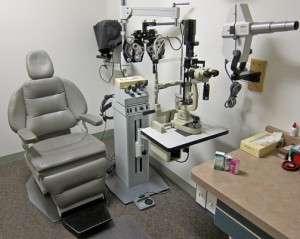 When you visit an optometrist, you will receive what’s colloquially known as an eye exam. During an eye exam, optometrists will ask you questions to obtain some history that may help them identify certain risk factors for eye conditions or diseases. They will then measure how well each eye can see, determine how well coordinated and aligned your eyes are, measure your prescription for glasses (if any), measure your eye’s internal pressure, and they will assess the overall health of your eyes.
When you visit an optometrist, you will receive what’s colloquially known as an eye exam. During an eye exam, optometrists will ask you questions to obtain some history that may help them identify certain risk factors for eye conditions or diseases. They will then measure how well each eye can see, determine how well coordinated and aligned your eyes are, measure your prescription for glasses (if any), measure your eye’s internal pressure, and they will assess the overall health of your eyes.
If upon doing any of these tests they suspect that you may have an eye condition, they may request additional tests such as the measuring and mapping of your peripheral vision, scans of the internal tissues of the eyes, measurements of the thickness of your corneas, color vision testing, depth perception testing, contrast sensitivity testing and more. Depending on the optometrist, you may be required to do these tests regardless just to make sure nothing is missed.
After your eye exam, you may be diagnosed with a condition that requires your optometrist to prescribe you eyeglasses or contact lenses to help you see better. If you’re interested s/he may also refer you for refractive laser surgery, a procedure known as LASIK.
If your optometrist finds a health condition or disease of the eyes, you may be prescribed medications to help resolve the issue, or you may be referred to a specialist who is better suited to treat your specific condition.
In a nutshell, your optometrist is your go-to person for both routine and emergency eye problems. However, if you have an eye emergency and your optometrist is not available, you should go to the hospital emergency room.
What’s The Difference Between Optometrists and Ophthalmologists?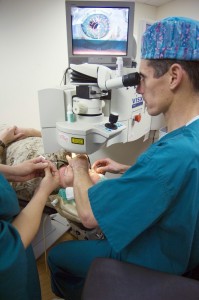
Ophthalmologists begin their training in medical schools. In the United States there are 141 medical schools and in Canada there are 17. Once they complete their 4 year medical program, future ophthalmologists receive a Doctor of Medicine degree. From there, to become an ophthalmologist, one must then do an ophthalmology residency which adds another 4 years to their training.
Ophthalmologists are generally not considered primary eye care providers. This means that to see an ophthalmologist, one is usually referred by another doctor. This is usually either your family doctor, your optometrist, or a different specialist. A referral to an ophthalmologist happens when your primary doctor cannot adequately manage your eye condition. Typically this will happen if you require eye surgery, if you are in the advanced stages of certain eye diseases, or if you are at high risk for developing an eye disease or compilation.
Ophthalmologists do not typically do routine comprehensive eye exams including checking your prescription for glasses. Depending on the sub-specialty of ophthalmology, an ophthalmologist may assess you for cataract surgery, manage your glaucoma, treat you for macular degeneration or diabetic eye disease, perform lid surgery or remove lumps and bumps from around the eye, treat you for corneal disease including performing a transplant if needed, and much much more.
If you decide to have laser eye surgery such as LASIK to permanently eliminate your need for glasses and contacts, your procedure will be performed by an ophthalmologist.
What’s The Difference Between Opticians and Optometrists?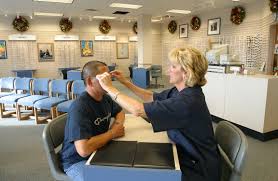
Opticians do not perform eye exams or surgery. They work in optical dispensaries, sometimes in conjunction with optometrists to help you fill your prescription for glasses or contacts. Opticians must undergo a two year program at an accredited educational institution before they can apply for a license to practice their trade.
Opticians will interpret your prescription for eyewear and based on the numbers, they will help you choose a suitable frame, select the most appropriate lens material, lens design and lens coatings. Before your glasses are sent away to be made, the optician will take very important measurements to make sure the power in your lenses line up with where your eyes are in the your glasses.
Opticians are also qualified to fit contact lenses, low vision aids such as magnifier, inverting telescopes, etc., and some types of prosthetic eyes.
Conclusion
If you’ve ever had an eye exam, you’ve probably seen an optometrists before. If you wear glasses or contacts, you’ve also most likely come across an optician before. Not everybody will have seen an ophthalmologist before, and I genuinely hope that everybody reading this will never have to. For if you do, unfortunately, there’s probably something wrong with your eyes.
I hope that helps clarify the difference between optometrists, ophthalmologists and opticians, otherwise known as the three O’s. If you still have any questions about any of them, drop your question in the comments section below.

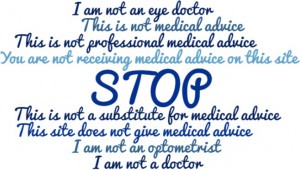
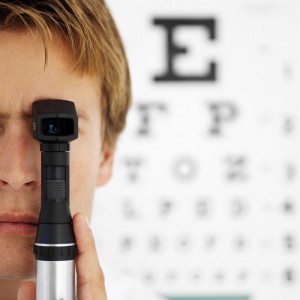
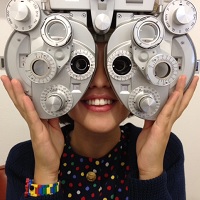


One Response
Medu
For the longest time, ignorantly, I called eye doctors opticians. Over time, I learned a little more and started calling them optometrists. I’ve just learned from this post that ophthalmologists actually get a medicine degree. I didn’t know that before now! Insightful! Thank you